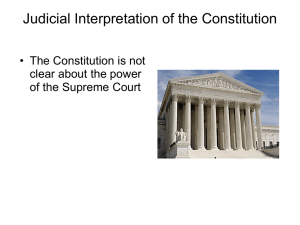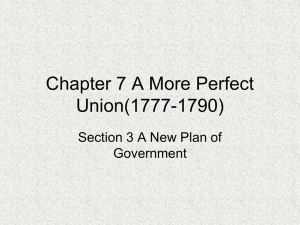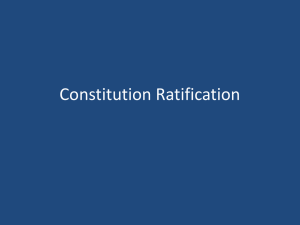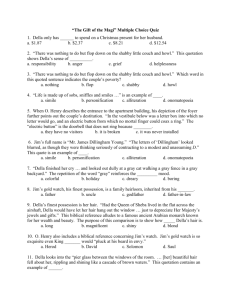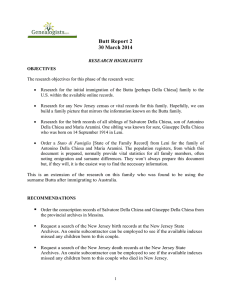Marbury v Madison.
advertisement
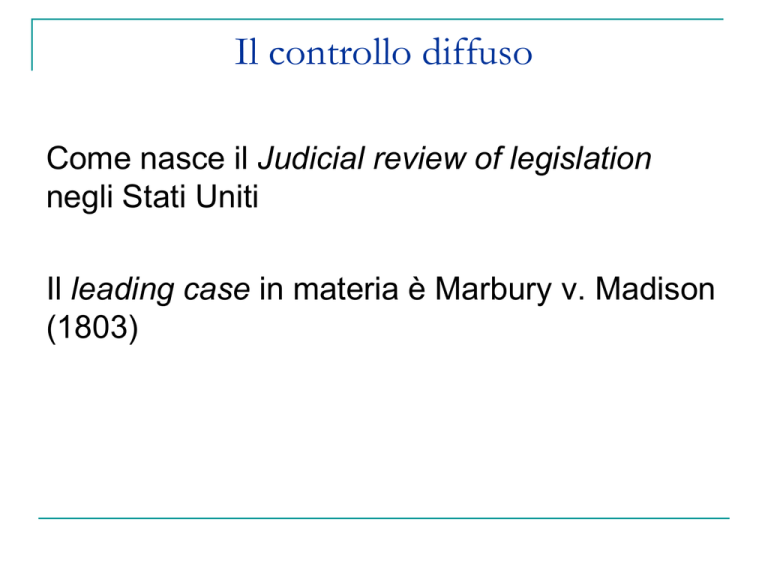
Il controllo diffuso Come nasce il Judicial review of legislation negli Stati Uniti Il leading case in materia è Marbury v. Madison (1803) Alcuni «anetecedenti». Il Bonham’s case (1610), stabilisce un principio che non attecchirà nel Regno Unito, ma negli USA: “(…) in many cases, the common law will control acts of parliament, and sometimes adjudge them to be utterly void: for when an act of parliament is against common right and reason, or repugnant, or impossible to be performed, the common law will control it, and adjudge such act to be void (…). Therefore (…), some statutes are made against law and right, which those who made them perceiving, would not put them in execution» The “Prisoners’ case” (1782) La Court of appeals della Virginia (1782): pur non individuando l’incostituzionalità della legge nel caso specifico, ma afferma (in obiter) il medesimo principio di Marbury v Madison. “The constitution is intended, as a rule for the governors-a law for the rule of the governed. But why pause? Do I tremble at the decision of my own mind, that a law against the constitution may be declared void? or do I dread the resentment of the court, when I bear testimony against their competency to pronounce the invalidity of the law? No! The revolution has given me a coat of mail for my defense, while I adhere to its principles. That bench too is reared on the revolution, and will arrogate no undue power. I hold then, that every law against the constitution may be declared void.” Alexander Hamilton, nel “Federalist” n. 78: If it be said that the legislative body are themselves the constitutional judges of their own powers, and that the construction they put upon them is conclusive upon the other departments, (…) The interpretation of the laws is the proper and peculiar province of the courts. A constitution is, in fact, and must be regarded by the judges, as a fundamental law. (…). If there should happen to be an irreconcilable variance between the two, that which has the superior obligation and validity ought, of course, to be preferred; or, in other words, the Constitution ought to be preferred to the statute, the intention of the people to the intention of their agents Marbury v. Madison L’art. 3 della Costituzione USA prevede le competenze della Corte Suprema: Original jurisdiction (corpo diplomatico, Stato parte) Appellate jurisdiction (NB: oggi quasi esclusivamente certiorari, solo se il caso è di particolare rilevanza) Non parla di judicial review of legislation Marbury v. Madison (1803) Nella pronuncia, la Corte suprema risponde a tre quesiti: 1. C’è un diritto? 2. Se c’è un diritto ed è stato violato, c’è un remedy? 3. Il remedy richiesto è quello giusto? 1. C’è un diritto? by signing the commission of Mr. Marbury, the president of the United States appointed him a justice of peace for the county of Washington in the district of Columbia; the seal of the United States, affixed thereto by the secretary of state, is conclusive testimony of the verity of the signature, and of the completion of the appointment; the appointment conferred on him a legal right to the office for the space of five years. 2. Right and remedy? The very essence of civil liberty certainly consists in the right of every individual to claim the protection of the laws, whenever he receives an injury. One of the first duties of government is to afford that protection. In Great Britain the king himself is sued in the respectful form of a petition, and he never fails to comply with the judgment of his court. 3. Quel remedy? Nella Costituzione si specificano i casi di original jurisdiction della Corte suprema. The authority, therefore, given to the supreme court (…) to issue writs of mandamus to public officers, appears not to be warranted by the constitution; and it becomes necessary to inquire whether a jurisdiction, so conferred, can be exercised. Le cose sono semplici… La Costituzione è al vertice della gerarchia delle fonti, quindi: Between these alternatives there is no middle ground. The constitution is either a superior, paramount law, unchangeable by ordinary means, or it is on a level with ordinary legislative acts, and like other acts, is alterable when the legislature shall please to alter it. If the former part of the alternative be true, then a legislative act contrary to the constitution is not law: if the latter part be true, then written constitutions are absurd attempts, on the part of the people, to limit a power in its own nature illimitable.




